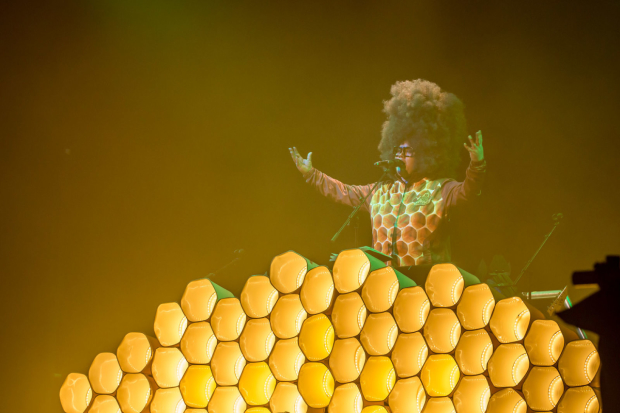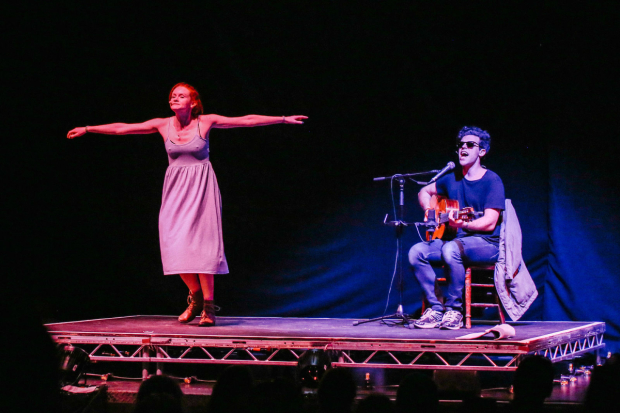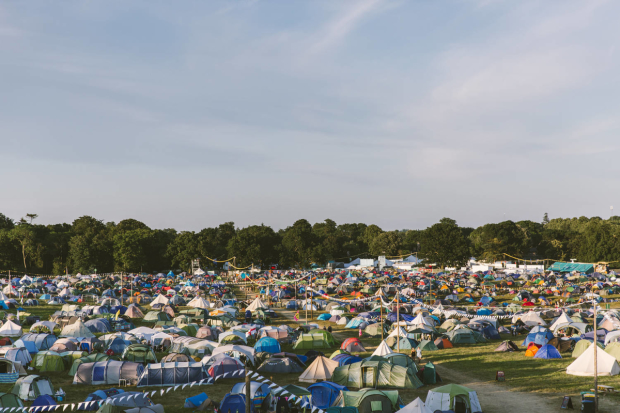Review: Latitude Festival (Henham Park)

© Victor Frankowski
The ears had it at this year’s Latitude Festival. If theatre sometimes felt like a sideshow – the art-form less prominent than in previous years – it may just have been that it blended in better.
Gig theatre was in abundance. The only show new to the UK – Tony-winner Stew’s The Negro Problem: Notes of a Native Song – was a blues gig about the work of black writer James Baldwin. Though slightly out of sorts in Suffolk, not its native Harlem, what it lost in intricacy, it made up for by reaching a new audiences to examine black leadership. Like Hot Brown Honey, the cabaret that drives diversity into variety that opened the theatre tent, it serves up straight-talking racial politics in a crowd-pleasing form.
Middle Child, newly elevated to the Arts Council’s National Portfolio, packed out the cabaret tent with their riff on British history, from Blair to Brexit, All We Ever Wanted Was Everything. Nabakov teamed up with band Benin City to mourn London’s lost nightlife. Welsh collective Gagglebabble resurrected its sultry song-cycle Sinners Club. Noah and the Whale’s Charlie Fink dusted down his acoustic set Cover My Tracks.
Sometimes the form loses its frisson, shown up by great gigs elsewhere on site
You’d think a festival context would be ideal. In some ways it is: the speakers are loud enough, the crowd gets stuck in. Sometimes though, the form loses its frisson, fitting in, not jutting out. It can fall between two stools, shown up by great gigs elsewhere on site. HighRise Theatre’s dystopian grime gig Merryville, for instance, felt a mish-mash here; its politics, off the peg; its rhythms and rhymes, uninspired and derivative. The 11am slot didn’t help, but it looked a pale, even slightly pathetic, imitation of the real thing nearby.

© Lauren Maccabee
Cat and Mouse fared far better, its dog-masked house band supporting, but never overshadowing, the Itchy and Scratchy animations of 1927’s Paul Barritt. He renders capitalism as a classic cartoon. In a series of skits, a moneymaking mouse endlessly exploits a load of consumerist cats, pushing catnip on them or plucking out their cat’s eyes for profit. Even over-long at an hour, it’s a neat illustration of the self-defeating cycles that motor the rat race.
This was a festival full of audio all-sorts: sheds doubling up as tiny opera houses and speakers tinkling opera dotted through the forest. Every so often, The Arbonauts amassed: a yellow-gowned choir sending a birdsong chorus whooping through the woods. French and Mottershead offered audiences an experience of their afterlife in Woodland, a piece for headphones that talks you through your own decomposition. Verity Standen’s Symphony snaffled individuals away for a personal stereo experience. Two female voices synchronise in each ear, two tuning forks reverberate at the side of your head. It's like running a pipecleaner from ear to ear; the equivalent of having your head retuned.
Dotted through the Faraway Forest, such pieces are like listening posts. They open up temporary spaces away from stages and crowds; each a little interruption to the line-up; a chance for quiet reflection in the middle of a noisy festival.
Nothing benefits more than Come To Where I’m From. Since 2010, Paines Plough has invited playwrights to pen something – anything – on their hometown. It’s gradually grown into a map of the country. At Latitude, it’s an audio archive interspersed with live readings. Sally Woodcock questioned the notion of roots from her desk in London; Kefi Chadwick talked break-ups in Brighton. It’s a rare chance to hear playwrights, so often public thinkers, writing personally – no, more than that: being heartfelt. Each is a portrait of a place, and a person, but together, they make something more: a blur of ideas about belonging, being forged by or bound to a place, about leaving and coming back. Better still, it’s available as an app: not gig theatre, but theatre on-the-go.











